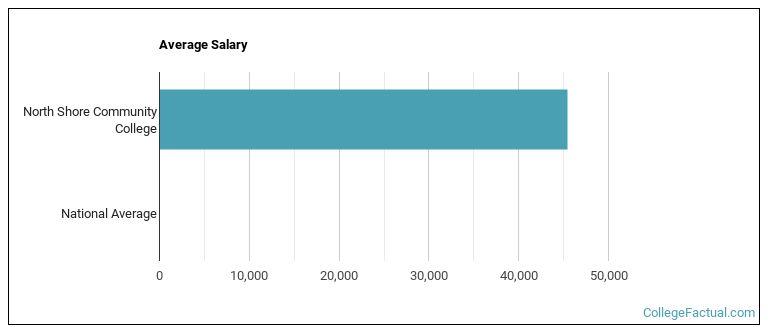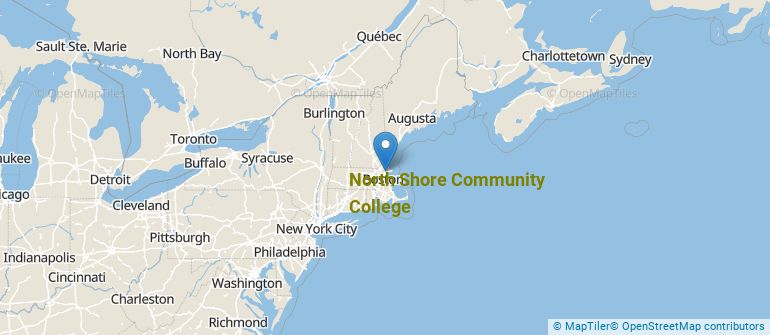 by our College Data Analytics Team
by our College Data Analytics Team
College Factual analyzes over 2,000 colleges and universities in its annual rankings and ranks them in a variety of ways, including most diverse, best overall quality, best for non-traditional students, and much more.
North Shore Community College was awarded 22 badges in the 2025 rankings. The highest ranked major at the school is human development & family studies.
Explore the best ranked schools for the programs you are most interested in.
North Shore Community College landed the #554 spot in College Factual's 2025 ranking of best overall colleges in the United States. The higher ed experts analyzed 2,152 colleges and universities across the nation to determine this ranking. This is an improvement over the previous year, when North Shore Community College held the #632 spot on the Best Overall Colleges list.
North Shore Community College also holds the #32 spot on the Best Colleges in Massachusetts ranking.
Since North Shore Community College has an open admissions policy, being accepted to the school isn't that hard. However, a full basic things - such as a high school diploma or equivalent - may be required. Also, go over your application to make sure it is complete before you submit it.
The student to faculty ratio is often used to measure the number of teaching resources that a college or university offers its students. The national average for this metric is 15 to 1, but at North Shore Community College it is much better at 12 to 1. That's good news for students who want to interact more on a personal level with their teachers.
Another measure that is often used to estimate how much access students will have to their professors is how many faculty members are full-time. The idea here is that part-time faculty tend to spend less time on campus, so they may not be as available to students as full-timers.
The full-time faculty percentage at North Shore Community College is 100%. This is higher than the national average of 47%.
The freshmen retention rate is a sign of how many full-time students like a college or university well enough to come back for their sophomore year. At North Shore Community College this rate is 53%, which is a bit lower than the national average of 68%.
During the 2017-2018 academic year, there were 4,783 undergraduates at North Shore Community College with 1,659 being full-time and 3,124 being part-time.
| $0-30 K | $30K-48K | $48-75 | $75-110K | $110K + |
|---|---|---|---|---|
| $7,095 | $7,400 | $9,653 | $11,772 | $12,977 |
The net price is calculated by adding tuition, room, board and other costs and subtracting financial aid.Note that the net price is typically less than the published for a school. For more information on the sticker price of North Shore Community College, see our tuition and fees and room and board pages.
It's not uncommon for college students to take out loans to pay for school. In fact, almost 66% of students nationwide depend at least partially on loans. At North Shore Community College, approximately 13% of students took out student loans averaging $4,070 a year. That adds up to $16,280 over four years for those students.
Get more details about paying for North Shore Community College.

See which majors at North Shore Community College make the most money.
Get more details about the location of North Shore Community College.

Contact details for North Shore Community College are given below.
| Contact Details | |
|---|---|
| Address: | 1 Ferncroft Rd, Danvers, MA 01923-0840 |
| Phone: | 978-762-4000 |
| Website: | www.northshore.edu/ |
| Most Popular Majors | Bachelor’s Degrees | Average Salary of Graduates |
|---|---|---|
| Liberal Arts General Studies | 235 | NA |
| Allied Health & Medical Assisting Services | 64 | NA |
| Health & Medical Administrative Services | 63 | NA |
| Human Development & Family Studies | 60 | NA |
| Nursing | 53 | NA |
| Criminal Justice & Corrections | 46 | NA |
| Mental & Social Health Services | 38 | NA |
| Allied Health Professions | 37 | NA |
| Fire Protection | 35 | NA |
| Practical Nursing & Nursing Assistants | 32 | NA |
Online learning is becoming popular at even the oldest colleges and universities in the United States. Not only are online classes great for returning adults with busy schedules, they are also frequented by a growing number of traditional students.
In 2022-2023, 2,078 students took at least one online class at North Shore Community College. This is a decrease from the 3,954 students who took online classes the previous year.
| Year | Took at Least One Online Class | Took All Classes Online |
|---|---|---|
| 2022-2023 | 2,078 | 899 |
| 2021-2022 | 3,954 | 2,825 |
| 2020-2021 | 3,038 | 1,253 |
| 2018-2019 | 1,627 | 569 |
Learn more about online learning at North Shore Community College.
Footnotes
*The racial-ethnic minorities count is calculated by taking the total number of students and subtracting white students, international students, and students whose race/ethnicity was unknown. This number is then divided by the total number of students at the school to obtain the racial-ethnic minorities percentage.
References
More about our data sources and methodologies.